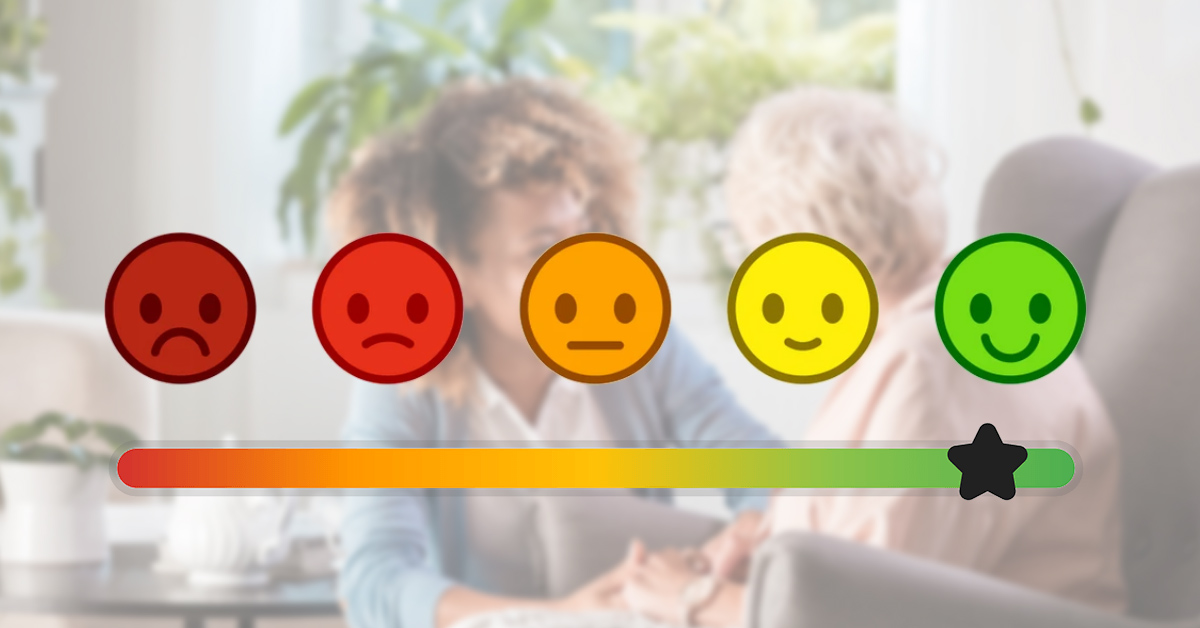
24 Jun Why Patient Satisfaction Scores Matter in Home Health
Agency owners monitor indicators and benchmarks for their organizations. These metrics evaluate performance and help leaders strategize for the future. Of all the data and reports that managers look at, patient satisfaction surveys may be more valuable than you think.
Patient satisfaction scores matter. They give agencies critical insight. If you’ve ever considered patient satisfaction scores less important than billing, compliance, or other key measures, read through this article. You may be surprised.
HHCAHPS
Launched for home health care in 2003 and publicly reported for the first time in 2012, the Home Health Care (HH) Consumer Assessment of Healthcare Providers and Systems (CAHPS) Survey is the first national standardized survey of home care patients about their skilled home care. The survey, conducted by third-party vendors, is a requirement for Medicare-licensed home care agencies that service 60 or more patients annually. Responses to a 34-question form are recorded, trended, and measured against state and national averages.
While these scores are only one piece of the puzzle that shows the quality of care an agency provides, it is an important piece. The HHCAHPS survey offers insight that no other report can give: a glimpse into the patient experience.
Patient surveys give providers the chance to identify areas for improvement. They tell organizations how they look, standing in the patients’ shoes.
Consumer Implications
Home Health providers may view their patients as customers that need their services. But individuals see themselves as consumers. The difference in perception is key.
Hospitals in the corporate sector have picked up on this. Over the past decade, large organizations have started to focus on the patient experience. By designing service lines and programs that cater to the patient, they function like the service industry. Healthcare facilities invest in customer service initiatives. The emphasis is on consumer satisfaction.
And rightly so. Service excellence in healthcare has been linked to:
- Customer loyalty
- Increased value to command higher prices
- Consistent profitability
- Better staff morale
- Reduced turnover
- Lower litigation risk
Customers have a choice in providers. With that in mind, it is easy to see why patient satisfaction scores matter.
Word of Mouth
 Word of mouth could make or break your business.
Word of mouth could make or break your business.
According to the White House Office of Consumer Affairs in Washington DC, a happy customer who has a problem resolved will tell four to six people about their positive experience. Therefore, satisfied patients and referral sources are critical to agency growth and success.
But a dissatisfied customer will tell 9-15 people about it.
One in ten will tell more than 20 people about their problem. And if they have a Facebook or Twitter account, well.
These statistics go to show how critical satisfaction is. Is one complaint worth 10-20 referrals? Many home care providers today cannot afford such a loss.
One of the best ways to identify and mitigate complaints is to solicit feedback from the customers. Then review the responses with an unbiased objective. Use satisfaction surveys as a starting point to identify patients and problems that need to be addressed.
The Ripple Effect
Research has shown that patient experience is positively associated with patient safety and clinical effectiveness. Data also proved that positive experience is related to better health outcomes, compliance to treatment, and lower resource utilization.
Good satisfaction scores have a ripple effect. The impact that patient satisfaction scores have can spread by improving results across the entire organization.
Another literature review of 62 journal articles example noted this ripple effect by showing a positive correlation between a company’s culture and outcomes. The workplace culture and customer service enhance health outcomes for patients. Engaging company culture can reduce mortality rates, falls, and healthcare-acquired infections.
Conclusion
In summary, patient satisfaction scores do matter. It can be tempting to dismiss results because they are directly tied to an individual’s perspective. However, the patient experience is an important indicator of past performance and future success.
How Can Alora Help?
Alora can help with marketing by offering reports and analytics to help you monitor referrals, clinical performance, productivity, finances, personnel, and compliance. In addition, our product helps you manage your agency. Contact us to schedule a demo today.
For more resources to help you thrive in-home care, follow Alora on social.
References:
- Home Health Care CAHPS Survey. (n.d.) About home health care CAHPS survey. https://homehealthcahps.org/General-Information/About-Home-Health-Care-CAHPS-Survey
- Prakash B. (2010). Patient satisfaction. Journal of cutaneous and aesthetic surgery, 3(3), 151–155. https://doi.org/10.4103/0974-2077.74491
- Goodman, J. (2006). Manage complaints to enhance loyalty. Quality control and applied statistics, 51(5), 535.
- Doyle, C., Lennox, L., Bell, D. (2013). A systematic review of evidence on the links between patient experience and clinical safety and effectiveness. BMJ Open, 3;3(1):e001570. http://dx.doi.org/10.1136/bmjopen-2012-001570
- Braithwaite J., Herkes J., Ludlow K., Testa, L., Lamprell, G. (2017). Association between organisational and workplace cultures, and patient outcomes: systematic review. BMJ Open. (7):e017708. https://dx.doi.org/10.1136/bmjopen-2017-017708
The Alora Homecare Software Blog
Read the Alora blog for industry news, including recent news, articles, and commentaries, as well as other issues that pertain to Homecare in the U.S and beyond. For more information on patient satisfaction scores, improving operations and patient outcomes, Home Health Software, or other related blog topics, questions, and feedback, please send us an email to HomeHealthSoftware@Alorahealth.com

No Comments